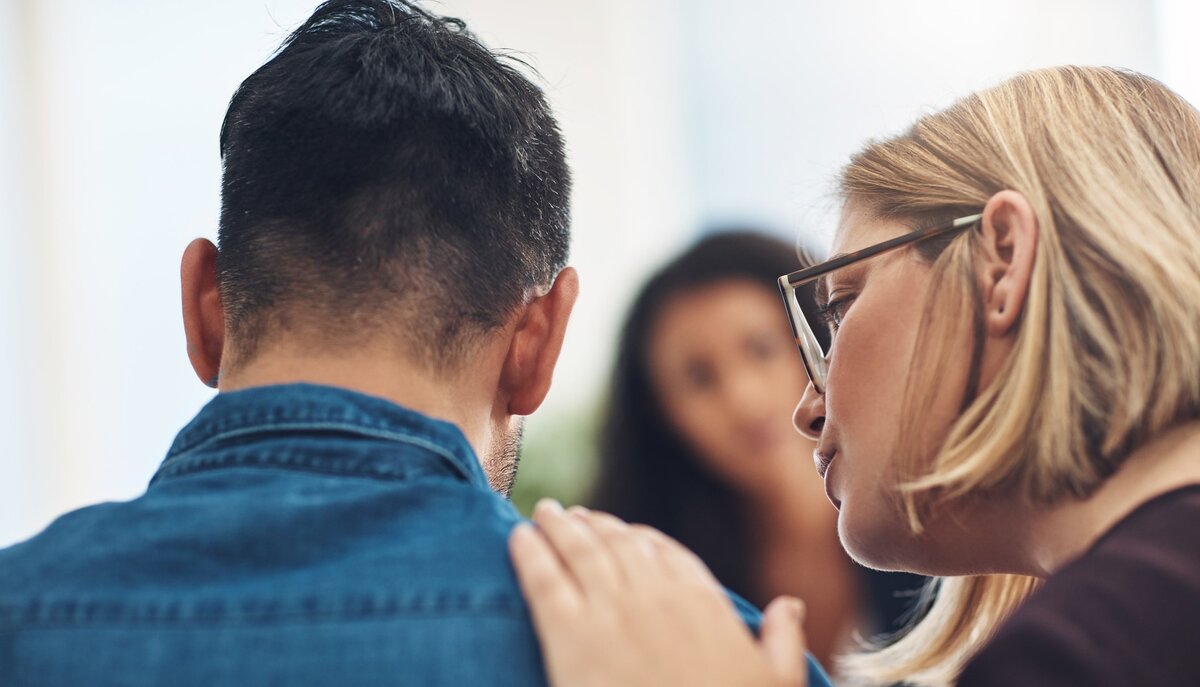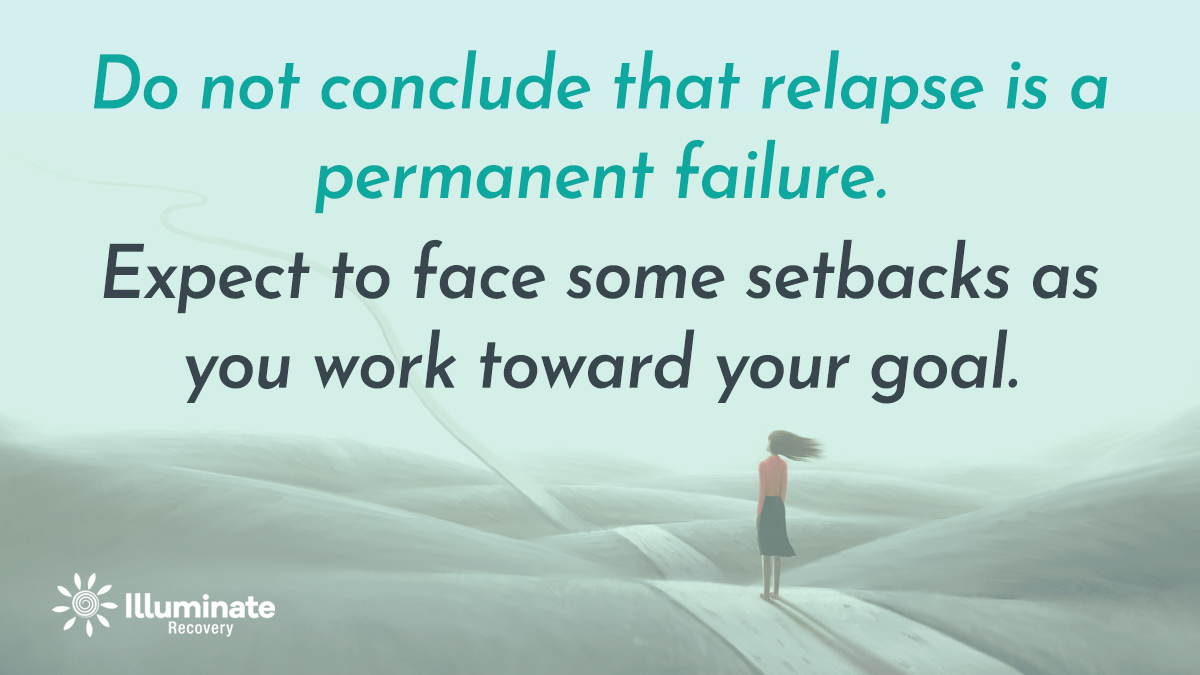To any family member or close friend of someone battling substance use disorder (SUD), the word “relapse” can conjure all sorts of feelings of dread and anxiety. While many may be unaware, relapse is an exceedingly common occurrence in the SUD world. However, it is important to not be paranoid about a potential relapse happening. Rather, everyone with a history of SUD and/or with loved ones in recovery should remain prepared for the likely eventuality.
Many with SUD fall into relapse, sometimes directly after a recovery center stay (within the first 30 days). It is crucial that the patient and their friends and family understand the likelihood of a relapse occurring, so they can keep their expectations at a realistic level. For those new to the world of SUD, it is good to be armed with the knowledge and nomenclature of a new life in recovery.
What is Relapse?
To really understand the nature of relapse, we must define it. Whereas “lapse” is the corporeal use of drugs/alcohol, “relapse” is then categorized as the returning to uncontrolled use of alcohol/drugs. It is not simply—as many believe—solely the physical use of alcohol and/or illicit drugs after abstinence or “quitting,” but actually a series of non-physical events that occur before the re-use of substances even begins. These intangible phases exist mentally and emotionally.
Emotional Relapse
During emotional relapse, some individuals are not thinking about using. They remember their last relapse and they don’t want to repeat it. But their emotions and behaviors are setting them up for relapse down the road. Because clients are not consciously thinking about using during this stage, denial is a big part of emotional relapse. Fear tends to be the largest emotional relapse trigger, and the feeling of fear can cause great anxiety and pressure on a person in recovery.
Mental Relapse
The second stage is mental relapse. Among mental relapse indicators is that the person thinks about or craves drugs or alcohol. It is possible for someone to crave substances or feel any of the mental relapse signals while in recovery while still not being in danger of a physical relapse. But when coupled with other mental and/or emotional relapse signs, it can be a good indication that the person might be on the road to physical relapse.
Other signs include:
- Remembering past use fondly or minimizing cost/risk/outcome.
- Negotiating—e.g. “It won’t hurt if I only have one drink…”
- Actively searching for opportunities to relapse.
- Thinking about people associated with using/environments where using happened predominantly.
- Lying about mental fixation on using.
- Actively planning a relapse.
Physical Relapse
The final “stage” of relapse is the physical state in which one partakes in their “drug of choice.” This phase can be a one-time event and not occur ever again or it could be a long period of time/many events of physical relapse. A person can come back from relapse.
How Do You Prevent a Relapse?

To prevent a relapse, knowing one’s “triggers” are handy. These triggers will have been identified and discussed at length by the person going through recovery with their mental health professional. Being actively involved with what is an emotional or physical trigger is not a bad idea, either, but hyper-focusing on it might make it a trigger (as opposed to preventing it).
Here is a short list of common risk-factors associated with relapse:
- Withdrawal—the physical and mental symptoms associated with sudden abstinence from a drug or alcohol. The levels of withdrawal experienced vary depending on the person abstaining from the drug, what drug they took, and the length of time/degree to which they used. Consulting a medical doctor is your best bet when navigating these waters, as they can supply you with a care plan to help mitigate these symptoms.
- Comorbidity with other mental illnesses – failure to make sure your loved one is receiving care for other mental health issues as well as their SUD
- Medical issues/accidents which cause pain – self-medicating with substances to prevent or relieve pain
- Stress and uncomfortable emotions
- Relationship problems – issues with familial, romantic, professional and other relationships that are stressed due to the SUD or other issues
- Peer pressure from friends, co-workers, loved ones, etc.
- Little-to-no social support/allies or self-isolation
- Lack of self-esteem or self-worth (“I can’t do anything right…”)
- Overly positive mood bordering on delusion – inability to identify when things are wrong, also known as “sunny side syndrome” (while it is good to have a positive attitude, that can have a negative effect when it starts to cloud judgement or acknowledging when things are not good).
- Overconfidence or pride – “I will never use it again no matter what!”
- Exposure to triggers (i.e. presence of substances, places where one has used and/or people who use)
- Poor self-care (hygiene, diet, home life, destressing techniques)
- Boredom/lack of healthy activities to supplant using
While over-fixation on relapse triggers can be a problem, so can codependent or enabling behavior, which can be summed up as anything that aids a person in recovery to use again (i.e. making excuses, taking blame for their actions/behaviors, and/or conflating your happiness/success/failures/etc. to theirs).
An Example of Relapse Prevention Methods
If you plan on going to a restaurant where people will be drinking at the table, simply ask if that is an issue for your loved one with SUD (specifically alcohol in this example). If they say “no,” trust that they know how it will affect them and do not draw attention to it or ask about it constantly—this will, in turn, make it a bigger deal than it needs to be and will make your loved one feel put on the spot.
Likewise, it is likely that a person with SUD says that a dinner out with people drinking would make them uncomfortable. If this happens, again, one should trust that the person knows their own circumstances and when they say it does not make them comfortable, do not press them to change their mind. Instead, see if there is an alcohol-free activity in which to engage or politely asking other members of the party to abstain at dinner. Again, do not hyper-focus or this will make the person with SUD feel like a burden or like their request for a non-triggering event is unreasonable.
It is crucial that loved ones and the person with SUD understand that, while there are some signals and triggers associated with relapse, it is not their responsibility to take full accountability for a person who does relapse. There are ways to help mitigate relapse, but it cannot be understated that, if a person should relapse, it is not anyone’s fault or worthy of guilt, shame, criticism, or anger from oneself or others.
What Does It Mean When Someone is Relapsing?
“Relapsing” as a verb does not mean that someone is actively using but rather in the process where the likelihood would be that they will physically relapse. Like stated above, it can also take place in the mind and be non-physical in nature completely. If you are unclear whether someone is in a state of relapse or in trouble of “fully” relapsing, it is best to talk to a professional therapist or recovery specialist.
How Do You Talk to Someone Who is Recovering?

To answer the question in this headline, ask yourself how you talk to anyone—normally, right? Your loved one is not a different species, nor did they become a different person with a new personality. Your loved one with SUD is still the same person they were, though they are actively abstaining from the substance that has become a destructive force in their life and in the lives of others.
Try to keep conversation as like their “pre-recovery” days in terms of tone. While they are still your loved one, a little bit of empathy goes a long way and encouraging them occasionally with small compliments on their progress is altogether a nice thing to do; recovery is to be congratulated and praised (although not fixated upon). Reaffirming subtly that they are a better person without their substance of choice helps tremendously.
Things to Say to Someone in Addiction Recovery
- “I’m really proud of your progress.”
- “You look so healthy!”
- “I loved that joke you told—it was hilarious.”
- “I knew you could do it! You’re awesome!”
- “I love you.”
- “You are so much fun to be around.”
- “That was such an interesting conversation—I really enjoyed your perspective.”
Things Not to Say to Someone in Addiction Recovery
While you should still treat your loved one with the same overall care and respect you would treat any other close friend or family member, it is important to know there are certain topics and questions which one should avoid not only because it might be detrimental to their recovery but also because it is just rude to bring up in conversation with anyone with SUD.
This does not mean you need to walk on eggshells around someone—just find a different topic of conversation, as there are millions out there.
Here’s a baseline list of questions and statements to avoid when conversing with your friend/family member with SUD:
- “You were much more fun when you were using drugs.”
- “I don’t know why you can’t be around people who are using—don’t be such a buzzkill.”
- “You’re being so sensitive right now—cut it out.”
- “I’m not your therapist. Go whine to someone else.”
- “If you use drugs again, I’m done with you.”
- “If you loved me, this wouldn’t have happened in the first place.”
- “Are you even trying to get better?”
Can You Come Back From a Relapse?
In a word, yes, anyone can come back from a relapse, given the proper tools, support, and care. As a loved one of someone with SUD, it is important to note, again, that this is not anyone’s fault and blame should not be assigned. Blame and anger are altogether counter-productive after a relapse and do not help anyone move past the event.
Here is a short list of things to do after a relapse:
- Emergency preparedness – if your loved one is addicted to opioids, it is important to have a naloxone kit in the home/car/on your person at all times. Using opioids always has a risk of overdose and naloxone is a safe, easy to administer medication that can reverse the effects of an overdose. Even if your loved one is not in recovery from opioid use, knowing medical response methods is vital—a person in recovery’s tolerance-level is much lower, so if they use again at the same level they used pre-recovery, it might have lasting or even fatal physical implications.
- Ask if they want to talk about it – sometimes they might wish to talk about the facts and circumstances that lead to their physical relapse, but sometimes not. Be sensitive to that, as the feelings of shame/guilt/anger might be too fresh for them to confront right away.
- Make sure they keep in contact (and are honest) with a trusted professional or sponsor in Alcoholics Anonymous or Narcotics Anonymous – reaffirm that you are not angry with them but simply want them to talk to someone who understands their situation better.
- Empathy above all – reassuring your loved one that you are here to get them the help they need is important.
- Maintain boundaries/self-care – you are just as important as your loved one, and it is possible to support them while still maintaining your own self-care and boundaries. If you feel you cannot do something, be honest about it and try to find someone who can within your loved-one’s support network (medically or otherwise). This is not abandonment or “passing the buck” but, rather, a form of self-protection.

All is Not Lost… Relapse Happens
Having a loved one in recovery start using again is scary, saddening, and yes, sometimes even angering. But knowing how to approach them with love, empathy, and support is integral in lowering their likelihood of another relapse. Just remember—should they relapse again, it would not be a failure so much as a condition of their mental illness, and it should be treated as such.




